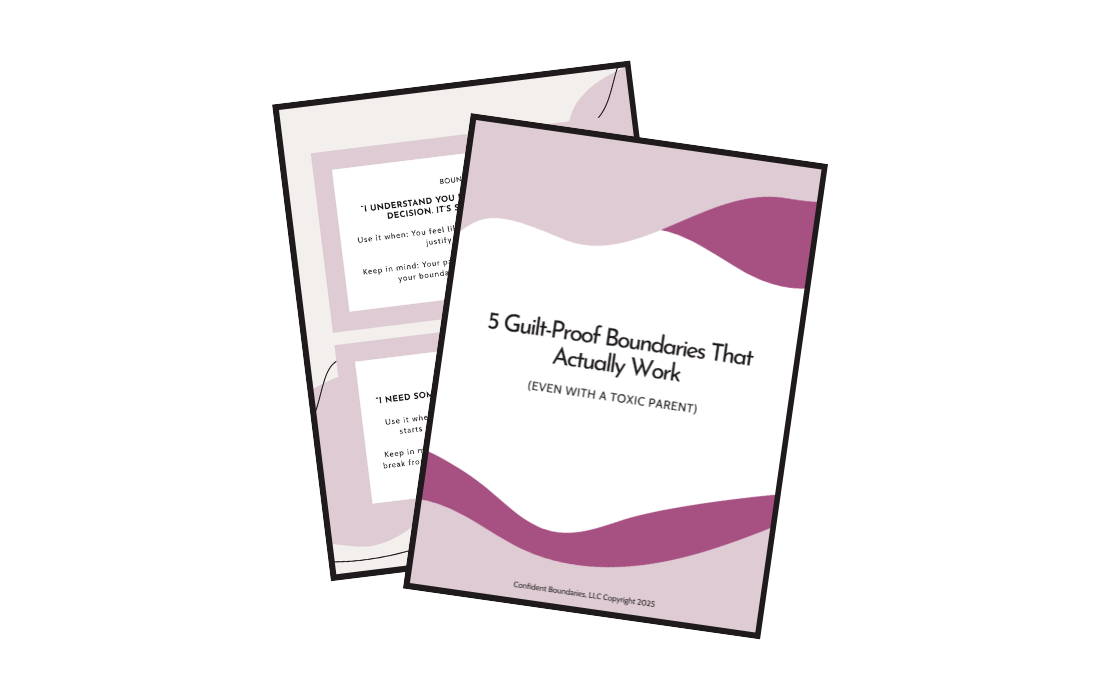
Why Most Boundaries Advice Doesn’t Work With a Narcissist Mother or Toxic Parent—And What Actually Does
If you've tried to set boundaries with your emotionally immature parent and still ended up feeling like you were the problem—you're not alone.
You’ve probably heard all the advice:
-
“Just communicate clearly.”
-
“Try to see things from their perspective.”
-
“Set firm limits and stick to them.”
But if your parent guilt-trips you, gaslights you, or erupts the second they don’t get their way… you already know that most advice doesn’t work with a parent like yours.
Here’s why—and what actually does.
Why Traditional Boundaries Advice Fails With Narcissistic or Emotionally Immature Parents
Most boundaries advice was created for functional relationships—where both people:
-
Want to understand each other,
-
Have the ability to regulate emotions,
-
And can handle discomfort without retaliating.
But when you’re dealing with a toxic family system, things are different.
Especially if your parent has:
-
Narcissistic traits
-
Borderline personality disorder
-
Extreme emotional immaturity
In those cases, traditional advice backfires.
Why? Because it:
-
Assumes your parent is rational (they’re often not)
-
Assumes they care about your emotional experience (they often don’t)
-
Assumes they’ll reflect on their behavior when confronted (they likely won’t)
What This Kind of Parent Actually Responds To
When your parent sees your boundaries as a threat, not a request, you need a new strategy.
This is where most cycle breakers get stuck.
They follow conventional advice, and then feel blindsided when their parent:
-
Calls them selfish
-
Accuses them of being dramatic
-
Breaks down crying, screaming, or stonewalling
That’s why Confident Boundaries teaches a completely different approach—one grounded in:
-
Psychological insight
-
Trauma-informed tools
-
Nervous system safety
Because when you’re dealing with a narcissist mother or emotionally immature parent, you need more than a script—you need a full strategy for before, during, and after the conversation.
What Actually Works With Toxic Family Dynamics
If your parent is reactive, manipulative, or emotionally volatile, here’s what makes boundaries stick:
-
Detach the boundary from their reaction
Your success isn’t measured by how they respond—it’s measured by how you follow through. -
Stop seeking validation
Parents with narcissistic or borderline traits will not give you approval. That doesn’t mean your boundary is wrong. -
Learn to regulate the guilt
Most of us were trained to feel bad the second we prioritize our needs. Learning to feel guilt without collapsing is the work. -
Use emotionally neutral language
You’ll get farther saying, “Here’s what to expect from me,” than “You hurt me and I need to protect myself.” -
Plan for enforcement
One boundary conversation won’t change a toxic dynamic. Expect pushback—and have a plan for what you’ll do next.
You’re Not the Problem. You’re Just Using the Wrong Tools.
If boundaries with your family haven’t worked, that’s not a personal failure—it’s a strategic mismatch.
You were likely taught to:
-
Prioritize your parent’s emotions
-
Keep the peace no matter the cost
-
Backtrack the second someone got upset
But real healing means learning how to:
-
Hold a boundary even when your voice shakes
-
Recognize gaslighting when it happens
-
Feel the guilt and still say no
Ready for Tools That Actually Work?
This is exactly why I created the Confident Boundaries Membership—and the Boundaries Workshop that’s helped dozens of cycle breakers like you learn how to stop backtracking, stop panicking, and finally hold the line.
If you’re ready for support that gets it, start here:
-
Join the Membership – Tools, coaching, and community built for adult children of toxic parents
-
Download the Free App – Pre-loaded with tools to help you break the cycle
You weren’t imagining it. And you’re not overreacting.
You just need tools made for the kind of family you grew up in.
You’re Not Crazy.
But you might have been gaslit by your parents.
Learn how to recognize the signs—and start rebuilding trust in yourself.
I hate SPAM. I will never sell your information, for any reason.



